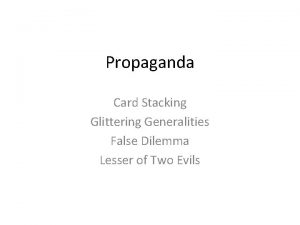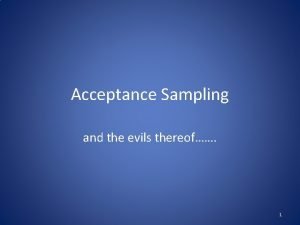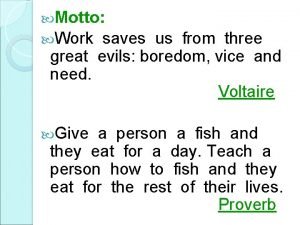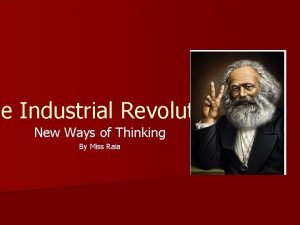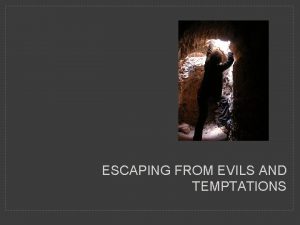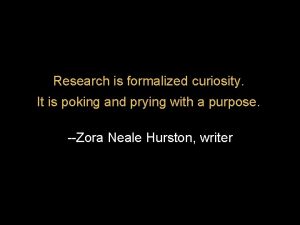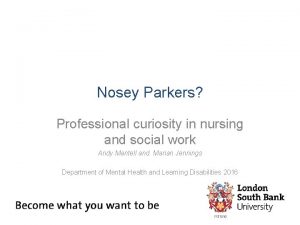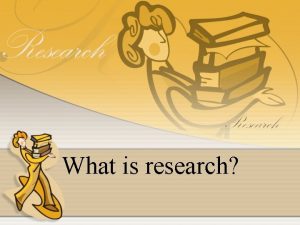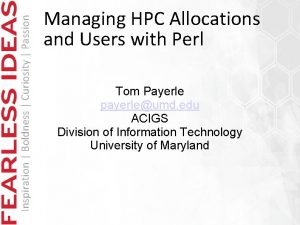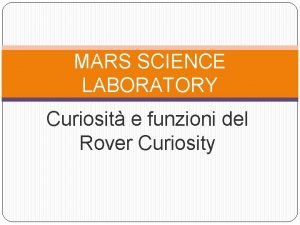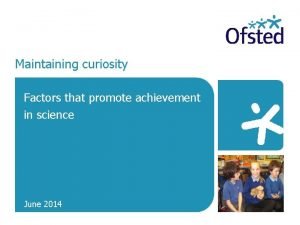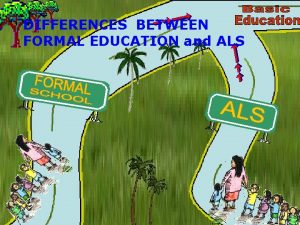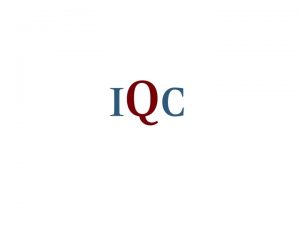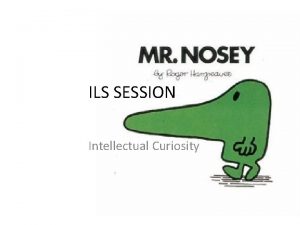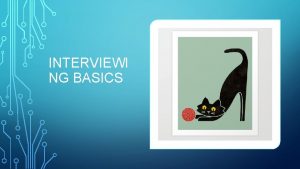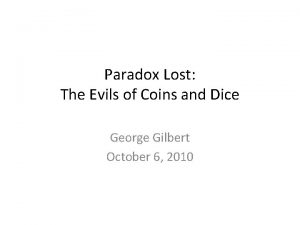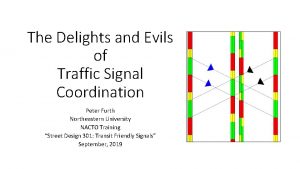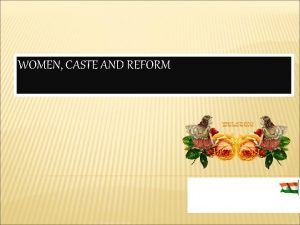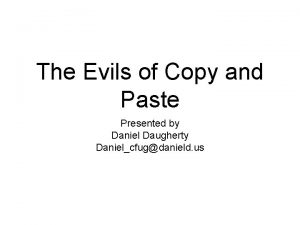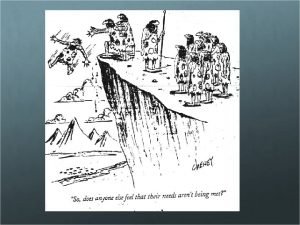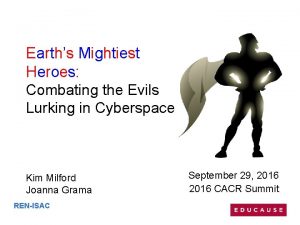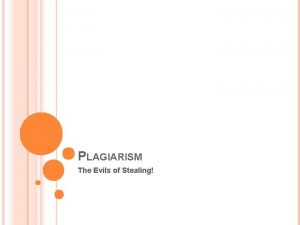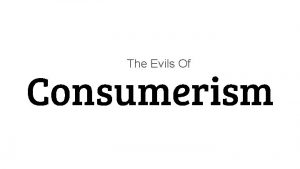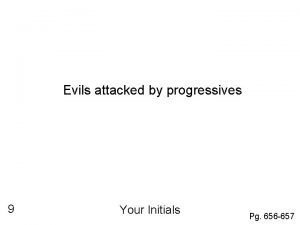Curiosity education and the evils of the Internet








































- Slides: 40

Curiosity, education, and the evils of the Internet Richard Watson Todd http: //crs 2. kmutt. ac. th/research/powerpoints

The cogs task • A cog

Even number of cogs

Odd number of cogs

Your task • Design a single chain of cogs with an odd number of cogs in it where the cogs will rotate smoothly

A Mobius strip has only one surface and one boundary

M C Escher

Why use this task? Thinking Curiosity

What is the prime purpose of education? • Choose only ONE 1. Training students to be useful employees in the workplace 2. Enabling students to learn what they want 3. Fostering students’ intellectual growth 4. Developing students’ critical consciousness to change society

Dearing Report on Higher Education Training students to be useful employees in the workplace Enabling students to learn what they want Economic efficiency Learner centredness Fostering students’ Academic rationalism intellectual growth Developing students’ Social reconstructionism critical consciousness to change society

Educational ideologies in Thailand • Economic efficiency • Ministry of Education reform plan, August 2014 • “Developing higher and vocational education to be in line with domestic labour demand” • National Education Standards, 2004 • Education is essential for “vigorous competitiveness in the international arena”

Educational ideologies in Thailand • Economic efficiency • “Education is important to Thailand because quality education will produce a valuable workforce that could serve the demand in the globalised world and improve the country’s competitiveness. . . The objective is to develop quality people so we will have knowledgeable workers for the globalised world. The country’s competitiveness will improve significantly and noticeably over the next 10 years. By then, we will be able to compete with any rivals in the region. ” • Wijit Srisa-arn, Minister of Education, 2007

Problems with economic efficiency • Driven by sociopolitical change to postmodern capitalism • Performative basis means that education focuses on what can be measured, not what is of value • The changing world means that knowledge and skills learnt for the current job market have a short lifespan

Current education goals • ABET (engineering accreditation): – an ability to communicate effectively; – the broad education necessary to understand the impact of engineering solutions in a global and societal context; – a recognition of the need for, and an ability to engage in life-long learning; – a knowledge of contemporary issues. • Intangible goals do not fit with economic efficiency

An alternative Thai educational ideology • Learner centredness • “The teaching-learning process shall aim at enabling the learners to develop themselves at their own pace and to the best of their potentiality” • The National Education Act 1999 Section 22

A counter-quote • Social reconstructionism • “This instrumental need for education viewed people as tools for economic growth. Children were supposed to learn how to become efficient and obedient workers and subjects. The goal was not for most of those children to enjoy the fruits of development during their lifetime but rather for them to work for the good of the “nation” which truly meant the growth of Bangkok and the interests of the elite. ” • Feigenblatt et al. , 2010

Another counter-quote • Academic rationalism • “To see an education, college or otherwise, as merely a way to increase the amount of money you make is a terrible corruption and fundamentally unsustainable. Education was never intended that way, and it cannot succeed on those grounds. If learning is not for its own sake, it isn't liberal learning. It's a utilitarian calculus for material self-advancement. The important things are not worth knowing because they are useful. They are worth knowing because they are true”. • Andrew Sullivan, 2011

The purpose of education • “Knowledge should be sought with a view to the beautiful and the good” Socrates • “Education’s end is the pleasure of knowing itself” Aristotle

The purpose of education • “Education is the enthusiastic study of subjects for the love of them without any ulterior objects” Charles Eliot, Harvard President 1869 -1909 • “Knowledge is capable of being its own end” Cardinal Newman

What knowledge is worth knowing? The traditional Western canon • • Plato Chaucer Shakespeare Descartes Hume Kant Darwin • • Tolstoy Freud Dewey Wittgenstein Keynes Proust Kafka

Culture Wars High culture • War and Peace • Mozart • Shakespeare Popular culture • Citizen Kane • Fifty shades of grey • Justin Bieber • Soap operas • Police Academy Quality Relativism

• Quality exists • Quality is not restricted to high culture • Quality can be accessible

Accessing quality • Read quality literature (not necessarily traditional classics) – Animal Farm George Orwell – Game of Thrones George R. R. Martin – จดหมายจากเมองไทย / Letters from Thailand Botan • Read quality factual books

The Earth – Richard Fortey Collapse – Jared Diamond Peoplequake – Fred Pearce No logo – Naomi Klein Bad science – Ben Goldacre The drunkard’s walk – Leonard Mlodinow The modern mind – Peter Watson The mismeasure of man – Stephen Jay Gould Quirkology – Richard Wiseman The balancing act – Joseph Wright

Books versus the web • 4. 4% of Thais read books regularly • In-depth argument • Immersion • Quality? • 56% of Thais are Facebook users • Surface browsing • Distraction • Quantity?

Why read books? • Democratisation of knowledge production • Massive quantities of worthless knowledge

Problems with the Net 1: Surface thinking • “The Net seizes our attention, only to scatter it” • “The Net’s cacophony of stimuli short-circuits both conscious and unconscious thought, preventing our minds from thinking either deeply or creatively” • “What the Net diminishes is … the ability to know, in depth, a subject for ourselves, to construct within our own minds the rich and idiosyncratic set of connections that give rise to a singular intelligence” • Carr, 2011

• Short attention span • Catchiness, not depth of argument

Problems with the Net 2: Intolerance • A real situation: – A man was arrested for stealing 3 coconuts from an orchard – The orchard owner demanded 50, 000 baht in compensation – Who is right?

Problems with the Net 2: Intolerance • The man arrested for stealing the coconuts: – Says he stole the coconuts because his pregnant wife wanted to eat them – Earns only 200 baht per day – Supports his pregnant wife and 3 children


Problems with the Net 2: Intolerance • The coconut thief has a long criminal record of theft and drug abuse • The orchard owner says that the man has been stealing fruit from her orchards for years • The orchard owner gave the man’s wife 100 baht to buy food after the man’s arrest

• On social networking sites, people hear one side of a story and make judgments • They provide strong criticisms of other people’s behavior • Society is becoming more judgmental and intolerant

Culture and social media • 2 sources of morality – Guilt culture: your conscience tells you what is moral and immoral – Shame culture: whether your community honours or excludes you tells you what is moral and immoral • Social media is changing morality from a guilt culture to a shame culture

Problems with the Net 2: Intolerance

Problems with the Net 3: Privacy • Who has a Facebook account? • Did you read the Terms of Service? – Anything you post on Facebook becomes their property. – Facebook can use any pictures or videos you upload for any purpose they want for free. – Facebook makes $3 billion selling your information to advertisers and marketing companies – "If you are not paying for it, you're not the customer; you're the product being sold. "

Problems with the Net 3: Privacy

Gains and losses from technological change • Access to quantity of knowledge • Opportunities to publish • Means of communicating • In-depth knowledge • Time to contemplate • Emphasis on quality • Tolerance for others • Privacy


Education needs to: • promote awareness of and access to quality knowledge • stimulate curiosity • encourage in-depth reading
 Glittering generalities and card stacking
Glittering generalities and card stacking D'evils sample
D'evils sample Work saves us from 3 evils
Work saves us from 3 evils The evils of revolution
The evils of revolution Evils
Evils Curiosity and the copycat
Curiosity and the copycat You mustn't try to build up a wall
You mustn't try to build up a wall Professional curiosity
Professional curiosity Define intellectual curiosity
Define intellectual curiosity Poking and prying with a purpose meaning
Poking and prying with a purpose meaning Natural curiosity
Natural curiosity Curiosity
Curiosity Professional curiosity munro
Professional curiosity munro Robot curiosity funzioni
Robot curiosity funzioni Maintaining curiosity
Maintaining curiosity Internet or internet
Internet or internet Difference between formal education and als
Difference between formal education and als Different between health education and health promotion
Different between health education and health promotion Hát kết hợp bộ gõ cơ thể
Hát kết hợp bộ gõ cơ thể Frameset trong html5
Frameset trong html5 Bổ thể
Bổ thể Tỉ lệ cơ thể trẻ em
Tỉ lệ cơ thể trẻ em Chó sói
Chó sói Chụp tư thế worms-breton
Chụp tư thế worms-breton Hát lên người ơi alleluia
Hát lên người ơi alleluia Các môn thể thao bắt đầu bằng tiếng đua
Các môn thể thao bắt đầu bằng tiếng đua Thế nào là hệ số cao nhất
Thế nào là hệ số cao nhất Các châu lục và đại dương trên thế giới
Các châu lục và đại dương trên thế giới Công thức tiính động năng
Công thức tiính động năng Trời xanh đây là của chúng ta thể thơ
Trời xanh đây là của chúng ta thể thơ Mật thư anh em như thể tay chân
Mật thư anh em như thể tay chân Phép trừ bù
Phép trừ bù độ dài liên kết
độ dài liên kết Các châu lục và đại dương trên thế giới
Các châu lục và đại dương trên thế giới Thể thơ truyền thống
Thể thơ truyền thống Quá trình desamine hóa có thể tạo ra
Quá trình desamine hóa có thể tạo ra Một số thể thơ truyền thống
Một số thể thơ truyền thống Bàn tay mà dây bẩn
Bàn tay mà dây bẩn Vẽ hình chiếu vuông góc của vật thể sau
Vẽ hình chiếu vuông góc của vật thể sau Nguyên nhân của sự mỏi cơ sinh 8
Nguyên nhân của sự mỏi cơ sinh 8 đặc điểm cơ thể của người tối cổ
đặc điểm cơ thể của người tối cổ
